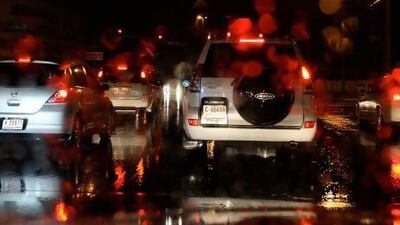When it comes to driving in the rain, I'm something of an expert. For most of my life, I lived in north Wales - one of the wettest parts of the UK - so practice at driving in inclement conditions kind of goes with the territory. Yet accidents on those sodden Welsh roads were few and far between, while here it's a completely different matter. If it rains here, I'll be staying indoors, as I'm not quite ready to shuffle off this mortal coil in a 150-car pile-up, thanks very much.
It comes as no surprise to hear people talking of huge accidents when it rains here. There is little or no storm drainage, meaning the fallen rainwater simply has nowhere to go and that means standing water on the road surface, which is sometimes deep enough to cause mechanical breakdowns.
But that shouldn't, in itself, be much of a problem. What is terrifying, however, is sharing the road in adverse conditions with drivers who don't seem to have enough intelligence to adjust their speed or driving style - ones who simply continue to drive aggressively no matter what.
Heavy rain and - another winter thing here - dense fog, vastly reduce visibility for obvious reasons. This causes most normal, considerate drivers to do two things: reduce their speed and increase the space between them and the car in front. Yet it's quite common to see drivers here doing things the other way around.
So, apart from increasing your distance and reducing your speed, is there anything else we should be doing when road conditions become arduous? Well, the same advice that applies to motorists in Europe and other rainy countries, applies equally here. It pays to be prepared before you encounter extreme weather, no matter if it's heat, cold or rain.
The summer heat, along with airborne sand and dust, can and does have a detrimental affect on rubber parts - your windscreen wiper blades being just two of them. So make sure that they do the job before you actually need them; worn or brittle blades are next to useless, and when the rain comes down hard you need them to be in fine fettle.
When it comes to driving through standing water, slowly but surely is the mantra. It can be very easy to get a bit of a bow wave going when wading through deep water, so keep the speed down to a walking pace while keeping your foot gently on the throttle (taking it off could send water up your exhaust pipe, with disastrous consequences for your engine). Drive on the highest part of the road - usually the centre - and, once you're clear of the water, dry off your brakes by steadily and gently applying them.
If you hit standing water at speed, there's a very high likelihood of aquaplaning, which is when the water forms a barrier between your tyre treads and the road surface, causing grip to instantly vanish. It's incredibly frightening and dangerous, so you need to take action right away. Simply keep steering straight, take your foot off the accelerator and DO NOT hit the brakes. Within a couple of seconds you should have regained control of your vehicle.
When it comes to lights, keep them on in rain but on dipped beam. In fog, by all means use your fog lamps but please do remember to turn them off again once it's cleared, otherwise you'll be blinding anyone driving behind you. Don't use hazard lights while on the move (if you've kept a decent distance between you and the car in front, there's no need for anyone to put them on in the event of hard braking). Hazard lights and main beam headlamps in fog are not only useless, they're also really dangerous to yourself and others.
Most of this is simple common sense. It's just that when many of us get behind the wheel, that's the first thing to go out of the window. If we all just react to road conditions, be they poor visibility or flooded surfaces, by slowing things down and keeping space between us, there's no reason why most accidents can't be avoided. Stay safe out there - as my father used to drum into me when I started driving at the age of 17, it's better to be late than dead on time.

